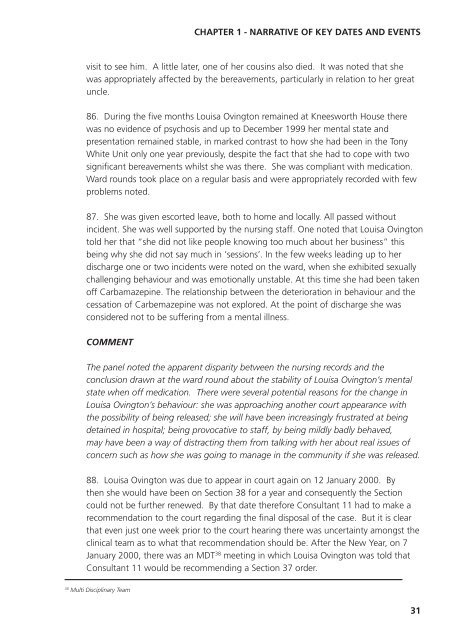Lousia Ovington independent investigation report ... - NHS North East
Lousia Ovington independent investigation report ... - NHS North East
Lousia Ovington independent investigation report ... - NHS North East
Create successful ePaper yourself
Turn your PDF publications into a flip-book with our unique Google optimized e-Paper software.
visit to see him. A little later, one of her cousins also died. It was noted that she<br />
was appropriately affected by the bereavements, particularly in relation to her great<br />
uncle.<br />
86. During the five months Louisa <strong>Ovington</strong> remained at Kneesworth House there<br />
was no evidence of psychosis and up to December 1999 her mental state and<br />
presentation remained stable, in marked contrast to how she had been in the Tony<br />
White Unit only one year previously, despite the fact that she had to cope with two<br />
significant bereavements whilst she was there. She was compliant with medication.<br />
Ward rounds took place on a regular basis and were appropriately recorded with few<br />
problems noted.<br />
87. She was given escorted leave, both to home and locally. All passed without<br />
incident. She was well supported by the nursing staff. One noted that Louisa <strong>Ovington</strong><br />
told her that “she did not like people knowing too much about her business” this<br />
being why she did not say much in ‘sessions’. In the few weeks leading up to her<br />
discharge one or two incidents were noted on the ward, when she exhibited sexually<br />
challenging behaviour and was emotionally unstable. At this time she had been taken<br />
off Carbamazepine. The relationship between the deterioration in behaviour and the<br />
cessation of Carbemazepine was not explored. At the point of discharge she was<br />
considered not to be suffering from a mental illness.<br />
COMMENT<br />
CHAPTER 1 - NARRATIVE OF KEY DATES AND EVENTS<br />
The panel noted the apparent disparity between the nursing records and the<br />
conclusion drawn at the ward round about the stability of Louisa <strong>Ovington</strong>’s mental<br />
state when off medication. There were several potential reasons for the change in<br />
Louisa <strong>Ovington</strong>’s behaviour: she was approaching another court appearance with<br />
the possibility of being released; she will have been increasingly frustrated at being<br />
detained in hospital; being provocative to staff, by being mildly badly behaved,<br />
may have been a way of distracting them from talking with her about real issues of<br />
concern such as how she was going to manage in the community if she was released.<br />
88. Louisa <strong>Ovington</strong> was due to appear in court again on 12 January 2000. By<br />
then she would have been on Section 38 for a year and consequently the Section<br />
could not be further renewed. By that date therefore Consultant 11 had to make a<br />
recommendation to the court regarding the final disposal of the case. But it is clear<br />
that even just one week prior to the court hearing there was uncertainty amongst the<br />
clinical team as to what that recommendation should be. After the New Year, on 7<br />
January 2000, there was an MDT 38 meeting in which Louisa <strong>Ovington</strong> was told that<br />
Consultant 11 would be recommending a Section 37 order.<br />
38 Multi Disciplinary Team<br />
31
















